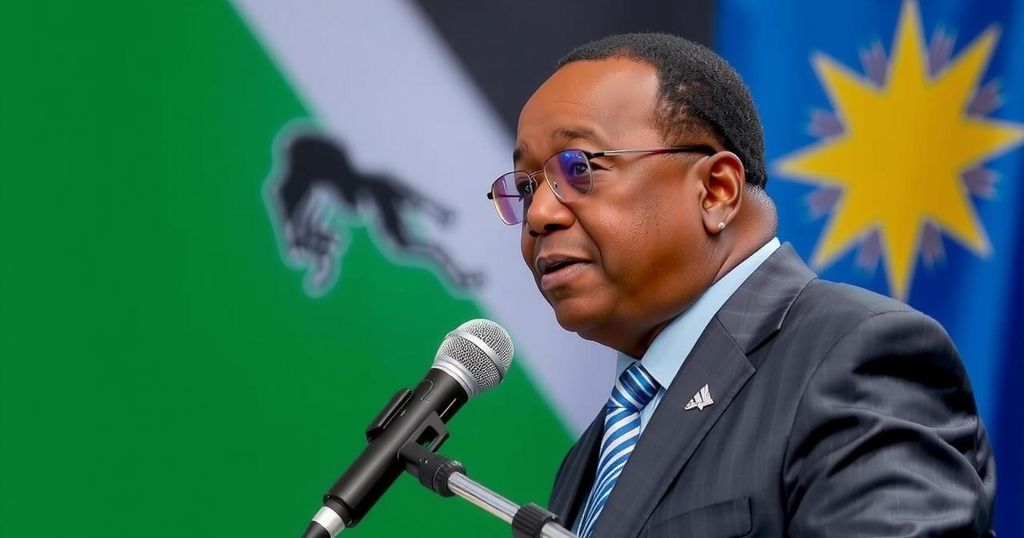Botswana Election: President Masisi’s BDP Seeks Another Five-Year Term

Botswana’s upcoming general election will test the ruling BDP’s ability to adapt to voter demands for change after 58 years in power. President Masisi’s call for renewed governance confronts significant socio-economic challenges, including high unemployment and wealth inequality. While opposition parties aim to address public discontent, their divided front may provide a path for the BDP to maintain its dominance in a closely contested political landscape.
Botswana’s governing party, the Botswana Democratic Party (BDP), seeks to extend its six-decade rule in the upcoming general election, highlighting its manifesto’s call for “change”–a phrase typically associated with the opposition. President Mokgweetsi Masisi, who has held office since 2018, recognizes the necessity for a shift in approach, as the opposition critiques the BDP’s capacity for transformation after so many years in governance. While analysts remain uncertain about the election’s outcome, the BDP has consistently secured impressive majorities since Botswana gained independence in 1966, in part due to its role in elevating the nation from poverty to one of the highest living standards in Africa, largely supported by its substantial diamond resources. Despite this progress, the country faces significant challenges, including a staggering unemployment rate, particularly among youth. According to the World Bank, one in four individuals within the workforce is currently unemployed, prompting Professor Zibani Maundeni to categorize Botswana as a “jobless economy.” The disparity in wealth distribution, with Botswana ranking as one of the world’s most unequal nations according to the Gini index, persists, raising questions about the effectiveness of the BDP’s governance. Masisi, however, continues to project optimism, arriving at election rallies in a locally assembled electric vehicle, captivating audiences with his humor and charisma. He appeals to voters by acknowledging past grievances stemming from the political fallout with former President Ian Khama. While some constituents express faith in Masisi’s governance, citing improved programs for businesses, prevailing public sentiment appears critical. A recent report by Afrobarometer reveals a general distrust in the government and a belief that corruption is rampant. BDP spokesperson Kagelelo Banks Kentse counters the critical poll findings by highlighting the party’s accomplishments and acknowledging the need for improvement in job creation. He outlines future plans to generate 300,000 jobs. Nonetheless, opposition leaders like Dumelang Saleshando maintain that the BDP fails to provide substantive change, critiquing its historical governance as stagnant and reactive rather than innovative. Amidst the backdrop of potential opposition success, analysts suggest that divisions within the opposition parties may allow the BDP to maintain its hold on power. The electoral system, based on first-past-the-post, could enable the BDP to capitalize on split votes among rival factions. Political tensions within both the ruling and opposing parties indicate an uncertain electoral future, making the upcoming vote critical for Botswana’s path forward. The pivotal question remains whether the BDP can reassure the electorate of its capacity to facilitate meaningful change in the face of mounting socio-economic challenges.
In Botswana, the BDP has dominated the political landscape since independence in 1966, characterized by impressive management of the nation’s diamond resources which fueled considerable economic growth. Nevertheless, with high unemployment rates and wealth inequality under scrutiny, voters are increasingly questioning the BDP’s effectiveness in addressing contemporary issues. As the nation gears up for another election, the BDP’s call for “change” signals an acknowledgment of the need for a renewed approach, especially among disenchanted constituents, while opposition parties strive to capitalize on the ruling party’s vulnerabilities.
The upcoming general election in Botswana embodies a critical juncture for the country’s long-established ruling party, the BDP. Despite its historical successes, the party may struggle to assure voters of its ability to enact genuine change amidst mounting socio-economic pressures. The opposition, buoyed by public dissatisfaction, stands poised to challenge BDP’s narrative, yet internal divisions within the opposition may hinder their effectiveness. Ultimately, the electoral outcome will hinge on whether the electorate in Botswana perceives the BDP as a capable steward of change or as a party resistant to transformation.
Original Source: www.bbc.com







